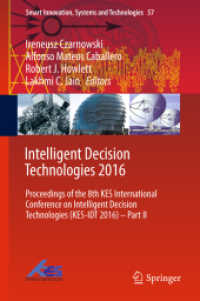- ホーム
- > 洋書
- > 英文書
- > Business / Economics
基本説明
The Robin Hood Foundation, New York City's largest poverty-fighting organization, has pioneered a metrics-based approach that support and encourage "smart philanthropy". Weinstein and Bradburd make a compelling case for this method, demonstrating how it can be used by funders, nonprofits, and prospective grantees.
Full Description
The Robin Hood Foundation is a charitable organization focused on alleviating poverty in New York City. Michael M. Weinstein is the foundation's senior vice president. In that role he developed its metrics-based approach, called "relentless monetization," to ensure that the money the foundation receives and grants is used most effectively. Ralph M. Bradburd has served as long-time consultant to Robin Hood on matters of metrics. In this book Weinstein and Bradburd show how to implement the Robin Hood approach and explain how any nonprofit organizations or philanthropic donor can use it to achieve the greatest benefit from every philanthropic dollar. Drawing on their extensive knowledge, the authors devote specific chapters to the difficulties most frequently encountered by donors trying to measure the benefits of their initiatives. This book provides straightforward, targeted advice for funding "smart" nonprofit programs.
Contents
Preface 1. Overview of Relentless Monetization 2. Translating Mission Into Mission-Relevant Outcomes 3. Basics of Monetizing Outcomes 4. Those Pesky Counterfactuals 5. The Meaning of Present Discounted Values 6. Examples of Metrics by Outcome 7. Examples of Metrics by Grant: Multi-Outcome Interventions 8. Completing the Analytical Traverse: Small-Bore Benefit/Cost Analysis 9. Key Generalities: Q&A 10. Six Purposes 11. Prominent Metrics Systems 12. Reflections on Risk 13. Conclusion Appendix A: Counterfactual Complications: Shared Responsibility Appendix B: Choices Between More and Less Risky Initiatives Appendix C: Calculating a Program's Expected Well-being Impact Notes Index
-

- 電子書籍
- 拳銃つかいの最後
-

- 電子書籍
- 好きっていいなよ。(16)






